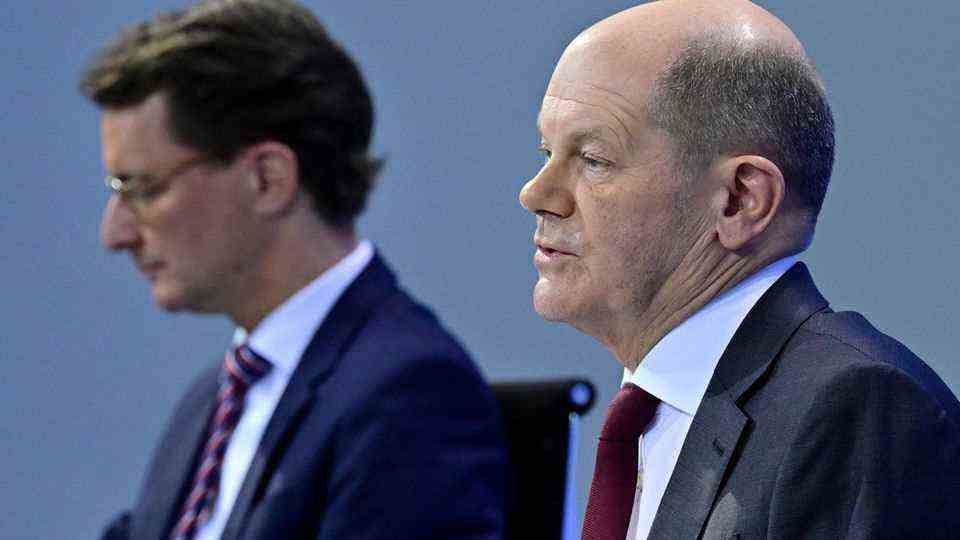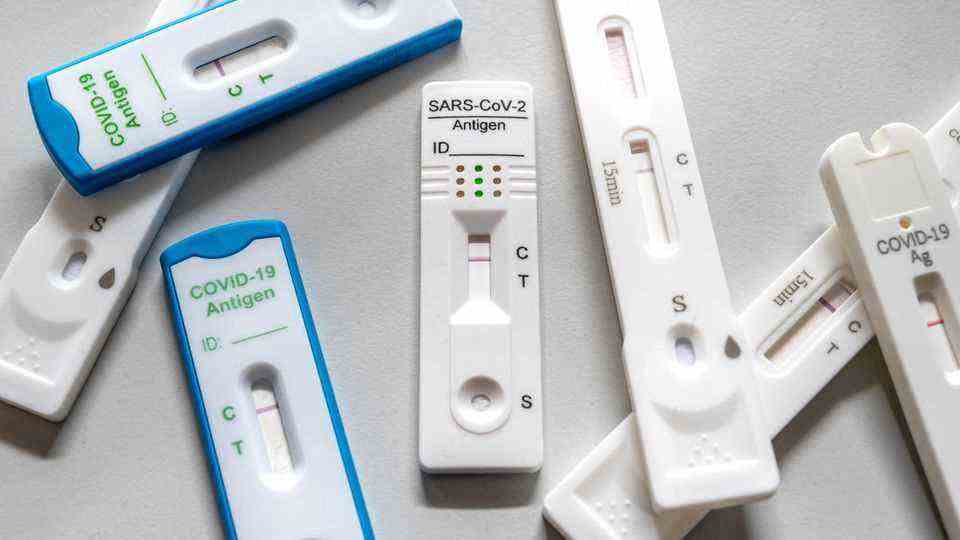Corona resolutions
Half-baked, unclear, reckless: the federal and state governments are changing the test strategy – and are receiving criticism
Adaptation of the corona test strategy: Federal Chancellor Olaf Scholz (middle), North Rhine-Westphalia’s Prime Minister Hendrik Wüst and Berlin’s Governing Mayor Franziska Giffey after the federal-state meeting in the Chancellery
© Hannibal Hanschke / DPA
They are the “gold standard”: PCR tests are considered absolutely safe for corona detection. But given the exploding number of infected people, they are becoming scarce. The federal and state governments are therefore now accepting risks.
The federal-state agreement on changing the corona test strategy leaves many unanswered questions and is also met with criticism. The accusation from experts, associations and opposition politicians after the consultations between Chancellor Olaf Scholz (SPD) and the prime ministers of the federal states on Monday: immature, unclear in the details, possibly too careless.
What do the labs say about this?
The Association of Accredited Laboratories in Medicine (ALM) called on politicians to talk about the intended expansion of PCR test capacities. “We would have to know by how much the capacity should be increased and in what period of time,” said Michael Müller, chairman of the German Press Agency. It’s about devices, about employees and also the question of what happens if the higher capacity is built up and then, in case of doubt, not needed. At the editorial network Germany (RND), Müller warned: “We cannot expand the capacities at will from one day to the next.” The chairman of the professional association of German laboratory doctors, Andreas Bobrowski, told the “Welt” that the shortage of laboratory staff cannot be remedied for the time being.
Are there PCR alternatives?
The health policy spokesman for the Greens in the Bundestag, Janosch Dahmen, has already suggested evaluating PCR tests in the pool process in the future. Germany is lagging behind other countries because of its strategy of individual evaluation, he told the “Welt”. In the pool procedure, several samples are tested at the same time. If the result is positive, all tests are evaluated again individually. That ties up less capacity.
Federal Minister of Health Karl Lauterbach (SPD) said on the ARD with a view to the previous government: “This procedure was not prepared a year ago, so we cannot fall back on it now.”
The Association of German Cities suggested using so-called POC-PCR tests to expand PCR capacities, which do not require a laboratory and are intended to deliver fast results. “But then the funding for these tests would have to be improved,” said City Day President Markus Lewe of the German Press Agency.
After a corona alarm in hamsters in Hong Kong: These animals have also been infected with the virus
13 images
What have the federal and state governments decided?
Due to the skyrocketing number of infections, the current capacities for the particularly precise PCR tests are no longer sufficient. The federal and state governments have therefore agreed to focus their use on people from corona risk groups and employees who care for and treat them – in clinics, nursing homes and facilities for people with disabilities. Certified rapid antigen tests should be sufficient for free testing from contact person quarantine or infected isolation, but they are considered less reliable.
Are rapid corona tests sufficiently reliable?
Lauterbach said: “If two antigen tests are positive in a row, then that is almost as certain as a PCR test.” It is only “very rare” that they deliver a wrong result.
The laboratory doctor representative Müller sees it differently: “Rapid antigen tests do not offer sufficient certainty for clear testing. We see too many false rapid test results in our everyday laboratory work and therefore recommend consistent clear testing using the PCR method.”
The Bremen epidemiologist Hajo Zeeb is also on this line. “It is problematic that in the future clinic and nursing staff will be able to test themselves with an antigen test after seven days,” he told RND. “I think it makes sense that PCR testing would continue to be used in these sensitive areas.”
What is the opposition saying?
Union faction leader Ralph Brinkhaus even insists on PCR testing options for all citizens, despite the bottlenecks. “All citizens must have the opportunity to get certainty through a PCR test if they suspect corona or are infected, but also after they have survived the corona infection,” he demanded in the newspapers of the Funke media group. Bavaria’s Prime Minister Markus Söder called it “unsatisfactory” that the PCR test capacities were not sufficient. The prioritization that has now been decided means that from this point onwards “we have no idea how high the number of infections really is,” he said in the ARD “Tagesthemen”.
For Left Group leader Dietmar Bartsch, the new test strategy is “not a breakthrough in effectively combating the pandemic, but a single communication chaos,” as he told the Funke newspapers.



